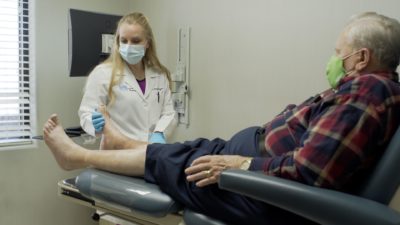What Types of Ulcers or Wounds Require Medical Treatment?
Foot ulcers or wounds in patients with diabetes should be treated to reduce the risk of infection and amputation, improve function and quality of life, and reduce healthcare costs. The primary goal in the treatment of foot ulcers is to obtain healing as soon as possible. The faster the healing, the less chance of a patient losing a limb. At Family Foot & Ankle Physicians, the podiatrists have training in the diagnosis and management of chronic, non-healing wounds such as:
- Diabetic Ulcerations: Diabetic ulcerations develop when high blood sugar levels damage the lining of your blood vessels, leading to wounds opening in your skin. Diabetes naturally slows down the healing process, which leads to non-healing wounds.
- Pressure Ulcerations: Pressure ulcerations develop when pressure is applied to the skin for long periods of time. This is often due to bed rest — which causes bed sores — but can also occur from improper footwear.
- Venous Ulcerations: Venous ulcerations develop in varicose veins that cause blood to pool in your veins and bulge outward. These damaged veins can break through your skin and open up, leaving a non-healing wound.
- Arterial/Ischemic Ulcerations: Arterial ulcerations develop due to poor blood flow, which allows the skin overlying your blood vessels to die, causing an open wound.
Ulcers can cause pain, itching, and general discomfort and can easily become infected, which may lead to gangrene and increases your risk of limb loss. If you see an ulcer on your foot or ankle, it is crucial to begin treatment early to prevent that limb loss, especially if you have diabetes or suspect you have diabetes. Early treatment is absoblutely the best treatment as ulcers can take a very long time to heal on the foot and ankle.
How are Ulcers Diagnosed?
Your Family Foot & Ankle Physicians provider diagnoses the cause of your ulcer after a thorough consultation and physical exam. They ask about your medical history, chronic health conditions, lifestyle, and symptoms. Your provider also examines your wound or ulcer to assess for artery and vein involvement and determines the severity of your ulcer.
Your provider works with you to explain the underlying cause of your wound and steps you can take to prevent more wounds from forming. Education is a key component of your wound care at Family Foot & Ankle Physicians to help prevent further ulcers on the foot and ankle.
How Are Ulcers Treated?
Family Foot & Ankle Physicians has the best wound care specialists in the eastern North Carolina area to help you heal. Your provider begins by carefully cleaning your wound and removing any damaged or dead tissue from the area. Family Foot & Ankle Physicians takes a comprehensive and long-term approach to treating ulcers and non-healing wounds to protect the health of your lower limbs and body as a whole.
Family Foot & Ankle Physicians has a primary location in Greenville, servicing cities such as Greenville, Farmville, Ahoskie, Kinston, Winterville, Tarboro, New Bern, Edenton, Washington, Rocky Mount, Windsor, and Williamston with patients coming from everywhere throughout eastern North Carolina and beyond. To request your appointment, call our Greenville office today, talk to your doctor about a referral or use the online booking tool here on our page to schedule your visit.
To learn more about wound care at Family Foot & Ankle Physicians, call your nearest office or use the online scheduling tool.
